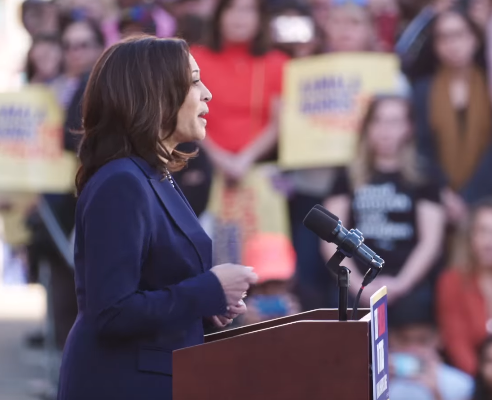Arvanitakis on American politics: the complexities of Kamala Harris

The announcement by the presumptive Democratic candidate, Joe Biden, that Kamala Harris will be his running mate was expected. Harris has served as the United States Senator from California since 2017 and was a candidate for the Democratic nomination until her campaign spectacularly crashed late 2019.
Harris is the first Asian American and the first Black woman in American history to be a general election candidate for president or vice president for either of the two major political parties. For those who do not know, Harris’s mother was born in India and her father in Jamaica.
After Barak Obama, Harris is also only the second Black person and the fourth woman (after Democrats Geraldine Ferraro in 1984 and Hillary Clinton in 2016, and Republican Sarah Palin in 2008) to be on a presidential ticket for one of the major parties.
While research suggests that the electoral impact of Vice Presidential candidates is limited, Biden’s campaign has already had a boost. Within hours of announcing Harris, Biden saw $32 million raised in two days.
Just as important as funds raised, Harris has given the Biden campaign a sense of new-found meaning. A challenge for Biden has been that he his best quality is that he is ‘Not Trump’. Biden, who is 77, has said throughout this campaign that he is just a “transitional” figure—a generational bridge. He sees himself as building a generational bridge to a new set of Democratic leaders.
A welcome figure that better reflects America’s rich diversity, Harris is nevertheless a complex a complex figure as a running mate that brings both positives and negatives.
1. Experience
Firstly, as a senator from California, she has excellent political experience. With almost 40 million people (according to 2019 estimates), California is the nation’s most populous state (with Texas is second at 29 million). It is a difficult and complex state to represent and according to former Sen. Claire McCaskill, Harris has represented California well.
Harris started as a courtroom assistant prosecutor, worked her way up to become the Attorney General of California in 2011, running an office with thousands of lawyers. As a Senator, she has been relentless in her questioning including sparing with US Attorney General William Barr about the President Trump’s interference of the Attorney General’s office.
2. Harris is not popular with the Party’s left or young voters
Both Senators Bernie Sanders and Elizabeth Warren were the favoured candidates of the Party’s left. With both losing the nomination, many of the Party’s liberal activists wanted Biden to pick Warren as his running mate. While Harris has a fairly liberal voting record in the Senate, her politics are far more centrist than Warren’s.
While some have argued that Harris might draw in younger voters who Biden has failed to inspire, as I have pointed out previously, this voting block tends to be much more progressive. Harris trailed both Sanders and Warren as preferred candidate for this demographic group.
While it is doubtful these voters will turn to Trump/Pence ahead of Biden/Harris, they may well decide they could not be bothered and not turn out at all.
3. It is no certainty Harris will draw in Black American voters
Harris does not have a huge support base amongst Black voters – who will account for about 13 percent of the 2020 electorate. As Perry Bacon Jnr noted, picking a Black nominee does not automatically create extra enthusiasm for the ticket with Black voters. Bacon noted:
“The percentage of Black voting-eligible people who cast ballots was significantly higher in 2008 (65 percent) and 2012 (66 percent), when there was a Black candidate on the ticket, compared to 2004 and 2016 (both around 60 percent) when there was not.”
Some political science research shows that Black people vote at higher rates when a Black candidate is on the ballot, although that finding is somewhat contested, and that research is about voting for a Black candidate at the top of the ticket, not a white candidate with a Black running mate.
But Harris is not Obama. While she ran for the president nomination for much of 2019, she was never the preferred candidate of older Black voters (they preferred Biden) or younger Black voters (who like other younger voters, preferred Sanders or Warren).
4. Harris’s terrible Presidential campaigns
Harris famously attacked Biden in early primary debates. Her performances were impressive and had many commentators talking about her as the likely Democratic candidate. A few months later, the Harris campaign was in disarray.
Much has been written about where it went wrong including an inability to galvanise a grassroots campaign, a lack of authenticity and no breakthrough message.
Key here was a lack of judgement that saw donors and supporters abandon her. Now surrounded by the Democratic Party machine, similar mistakes may not be likely but not everyone is convinced that she is up to the task.
In his analysis of the Harris nomination, Perry Bacon Jnr concludes, “the likely outcome is that Harris’s selection doesn’t change much — either Biden keeps his current lead and wins the presidency or Trump comes back based on factors that don’t have a lot to do with Harris.”
Given the many surprises that 2020 has delivered, anyone who states that Harris is a game changer will only be proven right if nothing else changes the game. Her first appearance with Biden shows Harris will not be a liability – and that makes her a better choice than John McCain’s decision to choose Sarah Palin in 2008.
Professor James Arvanitakis is the Executive Director of the Australian American Fulbright Commission – one of the world’s most prestigious international education and cultural exchange programs.














